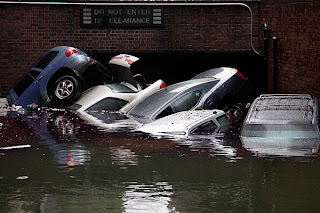.
SAFE AND SOUND
SAFE AND SOUND
 |
| Manhattan Parking Problem Tuesday |
First, let me say that I and my brother monks as well as our buildings and grounds, came through the wild weather of Sandy just about completely unscathed. We lost power for just less than 24 hours (the first time I can remember losing electricity because of a storm in the 43 years I’ve been here).
But the storm was something to watch from my fourth floor window that faces east, right into the teeth of the wind and rain. During the night on Monday I listened on my transistor radio to the incredible reports of what was happening just a dozen mile away in lower Manhattan, then on Long Island, and of course one of my favorite places, the New Jersey shore. We were without television, internet and even newspapers for 24 hours, but the vivid reports on the radio were quite horrifying enough.
 |
| Ocean (at bottom),cuts a new inlet at Mantoloking |
I felt both lucky and a little guilty hearing about people in the next town, Kearny, losing everything to the rising waters of the Passaic River, and of how the Atlantic had cut through Mantoloking, NJ, and made itself a new inlet into Barnegat Bay by removing all the houses in its way.
"THE WATERS HAVE LIFTED UP, O LORD"
I decided to pray some of the psalms of lament in the Old Testament, in which the psalmist cries out to God about his terrible plight. Along with praying these psalms I did a little background studying. Here’s a provocative passage I came upon as soon as I opened Brueggemann’s “The Message of the Psalms” to page 53:
It is no wonder that the church has intuitively avoided these psalms. They lead us into dangerous acknowledgement of how life really is. They lead us into the presence of God where everything is not polite and civil. They cause us to think unthinkable thoughts and utter unutterable words. Perhaps worst, they lead us away from the comfortable religious claims of “modernity” in which everything is managed and controlled. In our modern experience, but probably in every successful and affluent culture, it is believed that enough power and knowledge can tame the terror and eliminate the darkness. … But our honest experience, both personal and public, attests to the resilience of the darkness, in spite of us. The remarkable thing about Israel is that it did not banish or deny the darkness from its religious enterprise. It embraces the darkness as the very stuff of new life. Indeed, Israel seems to know that new life comes nowhere else.
And if Israel believed that, then we Christians, as daughters and sons of the Resurrection, believe it infinitely more deeply. The psalms of lament were spoken by deeply committed believers and directed to God personally, because God is the Lord of human experience and a partner with us in it. We can make these prayers our own.
A PSALM FOR SANDY
Maybe those of you who were not affected directly by the storm could pray for our brothers and sisters who were, especially for those whose homes were lost, whose workplaces were ruined, whose lives were changed forever the way the coastline was changed at Mantoloking.
In the following lament psalm the tone changes in verse 5 and 6 from lament to trust and even triumph, knowing that God will never abandon us. Pray this psalm with me for the victims of the storm.
How long will you hide your face from me?
2 How long must I bear pain in my soul,
and have sorrow in my heart all day long?
How long shall my enemy be exalted over me?
3 Consider and answer me, O LORD my God!
Give light to my eyes, or I will sleep the sleep of death,
4 and my enemy will say, ‘I have prevailed’;
my foes will rejoice because I am shaken.
5 But I trusted in your steadfast love;
my heart shall rejoice in your salvation.
6 I will sing to the LORD,
because he has dealt bountifully with me.
.
 |
| How long, O LORD? Will you forget me forever? |
.
.

No comments:
Post a Comment